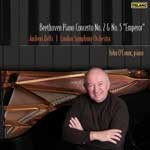
Piano Concerto Nos 2 & 5 Emperor
 $32.00
Out of Stock
$32.00
Out of Stock6+ weeks add to cart
BEETHOVEN
Piano Concerto Nos 2 & 5 Emperor
John O'Conor (piano) / London Symphony Orchestra / Andreas Delfs
[ Telarc / CD ]
Release Date: Friday 28 September 2007
This item is currently out of stock. It may take 6 or more weeks to obtain from when you place your order as this is a specialist product.
John O'Conor returns to Telarc with Beethoven's Piano Concerto No. 2 in B-flat major, Op.19 and No. 5 in E-flat major, Op. 73, "Emperor" under the baton of Andreas Delfs and the London Symphony Orchestra.
O'Conor first gained critical acclaim in the United States in 1986 with the release of the initial volume of the complete Beethoven Sonata cycle. He returns to Telarc with two of the five piano concertos.
Beethoven premiered the Piano Concerto in B-flat major at his first Viennese public appearance in which he shared the bill with Antonio Cordellieri. Beethoven later revised the work extensively for a concert in Prague; this is the version that is known today. The original one has vanished.
"The Second Piano Concerto is a product of the Classical age, not just in the date but also in the technique, expression and attitude," says Richard Rodda in the liner notes. "A traditional device - one greatly favored by Mozart - is used to open the concerto, a forceful fanfare motive immediately balanced by a suave lyrical phrase." The second movement is full of rich textures and is more like a song and is a reminder that Beethoven was one of the finest keyboard improvisers of his day. The finale is a rondo based on a theme that is immediately introduced by the soloist.
Unlike the Second Piano Concerto, the 5th came out of one of the most difficult times during Beethoven's life. The year was marked by Napoleon's invasion, which sent residents of Vienna scurrying and Beethoven into the basement of his brother's house. On July 29, 1809, he wrote to his publisher Breitkopf und Härtel, "We have passed through a great deal of misery. I tell you that since May 4, I have brought into the world little that is connected; only here and there a fragment. The whole course of events has affected my body and soul…What a disturbing, wild life around me; nothing but drums, cannons, men, misery of all sorts." By the end of this year, a great musical work was complete, Beethoven's "Emperor" concerto. The title "Emperor" attached itself to the E-flat concerto very early, though it was not of Beethoven's doing.
The nicknamed "Emperor" concerto opens with broad chords for orchestra answered by piano before the main theme is announced by the violins. When the orchestral tutti embraces the rich variety of the secondary themes a development ensues with "the fury of a hail storm," wrote British musicologist Sir Donald Tovey. The second movement begins with a chorale of strings. The Adagio leads directly into the finale, a rondo with sonata elements and the piece ends with the magical sounds of drum taps accompanying the shimmering piano chords and scales.
Through his recitals, concerto appearances and critically acclaimed recordings, the Irish pianist John O'Conor has earned a reputation as a masterful interpreter of the Classic and Early Romantic piano repertoires. He has been praised for his formidable technique and through his eloquent phrasing, mastery of keyboard color, and in particular his unique sound he has been called a true Poet of the Piano.
O'Conor has made more than 20 recordings for Telarc, including the complete Beethoven Bagatelles (which was cited by The New York Times as the best recordings of these works) and Mozart Concertos with Sir Charles Mackerras and the Scottish Chamber Orchestra. He has also recorded the complete Nocturnes, Sonatas and Concertos of the Irish Composer John Field.
Conductor Andreas Delfs is celebrating his 10th year as Music Director of the Milwaukee Symphony Orchestra and most-recently was appointed Principal Conductor of the Honolulu Symphony. Born in Flensburg, Germany, Andreas Delfs began the study of piano and music theory at age 5 and joined the roster of the Flensburg Stadttheater as conductor and composer at 17. He studied with Christoph von Dohnányi and Aldo Ceccato at the Hamburg Conservatory and served as a staff conductor at the Luneburg Stadttheater. At 20, he became the Music Director of the Hamburg University Orchestra, the youngest person ever to hold this post, and Musical Assistant at the Hamburg State Opera. Guest conductor at the Bremen State Theatre in 1981, Delfs graduated from Hamburg Conservatory that same year. Enrolling at The Juilliard School upon the recommendation of von Dohnányi, he studied with Jorge Mester and Sixten Ehrling, and won the Bruno Walter Memorial Scholarship on the way to receiving his master's degree in 1984.
Tracks:
Piano Concerto No. 2 in B-flat major, Op.19
Piano Concerto No. 5 in E-flat major, Op. 73, "Emperor"



